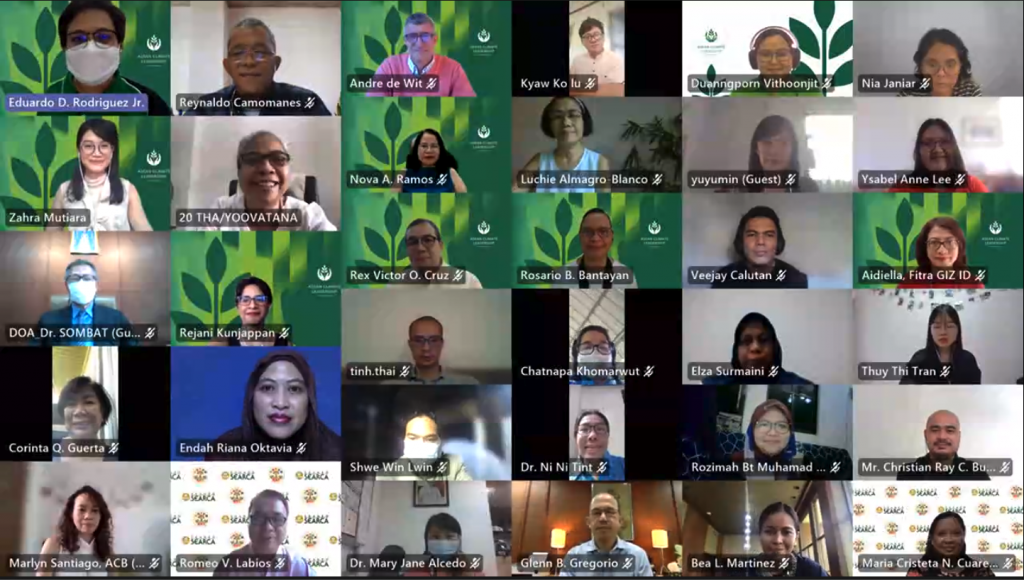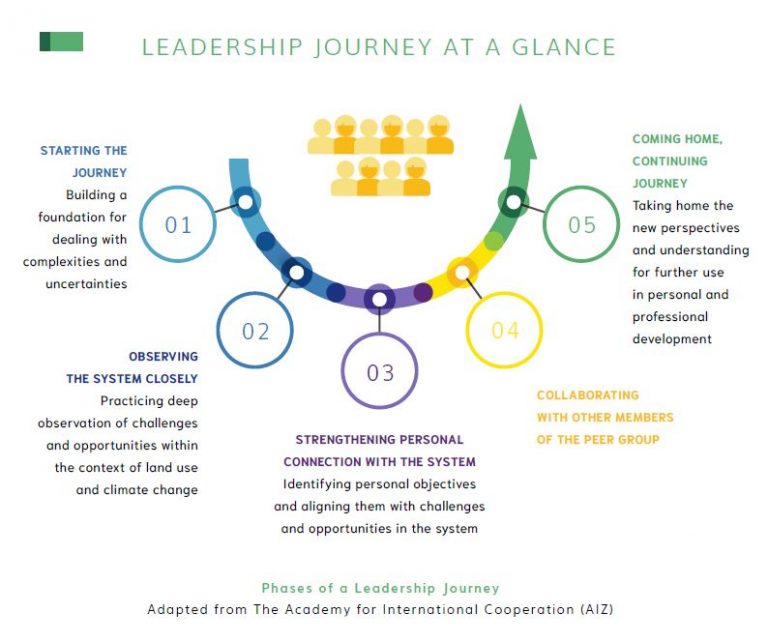
Building on last year’s success, the ASEAN Climate Leadership Programme (ACLP) 2021, which runs virtually from 18 August until 28 October 2021, is expected to provide participants with the necessary leadership tools and strategies to initiate change processes, as well as facilitate collective cross-sectoral transformative action in climate-smart land use.
The ACLP is designed to complement the work of the ASEAN Climate Resilience Network (ASEAN-CRN). This year’s guiding theme is Promoting Climate-Smart Land Use for Implementing Nationally Determined Contributions (NDCs). Comprised of five specific modules, the programme’s cornerstones include, among others, coaching and mentoring, self-reflection, journaling, and group work on Change Project. The participants will receive specific guidance from experienced leaders and technical experts on how best to navigate their professional aspirations pertinent to climate-smart practices in land use sectors.
Overall, the programme draws upon the Theory U, a framework that integrates systems thinking, leadership and organizational learning based on experience and expertise.
Strengthening regional climate leadership
The first module, Starting the Journey, provided introductions to the ACLP. The module workshop was held for two days, from 18 until 19 August 2021, to deliver introductory materials on the ACLP leadership model and personal leadership development plan, ASEAN regional policies and priorities relevant with Food, Agriculture and Forestry (FAF) sectors, and recent updates on climate-smart practices in land use sectors to an enthusiastic crowd of participants.
In his opening remarks, Dr Sombat Tongtao, Deputy Director-General of Thailand’s Department of Agriculture at the Ministry of Agriculture and Cooperatives, welcomed 22 participants from eight
ASEAN Member States. The participants represent a wide variety of public institutions, research agencies, and civil society organizations.
As the chair of ASEAN-CRN, he emphasized the importance of cross-sectoral collaboration to increase resilience toward shared challenges in the region, such as climate change and the COVID-19 pandemic. He also reiterated the region’s need for strong joint commitments and continued effort by all stakeholders to promote climate-smart land use practices, that play an integral part in achieving each ASEAN Member State’s goal to reduce greenhouse gas emissions and implement climate actions on a national scale.
Day One: Understanding climate-smart land uses
The participants explored the concept of climate-smart land use, including opportunities and challenges from the presentation of experts’ speakers.
Dr Florencia B. Pulhin, a university researcher at the Forestry Development Center at the University of the Philippines Los Banos, addressed pressing issues regarding the significant contributions of agriculture, forest and other land uses (AFOLU) toward greenhouse gas emissions. She also cited population and economic growth, among others, as the driving forces behind the continuous increase of global carbon footprint.
Meanwhile, Dr Elisabeth Simelton, a geographer and climate change scientist representing Center for International Forestry Research and World Agroforestry (CIFOR-ICRAF) elaborated the concept of climate-smart land use. She also underlined the implementation aspects of the concept by drawing on her experiences of developing a sustainable model of multifunctional climate-smart landscape in Viet Nam, as well as identifying lead actors whose roles are pivotal in carrying out climate resilient strategies.
Day Two: Setting priorities and policy guidelines
Opening the learning sessions on the second day of the workshop was Dr Dian Sukmajaya, a senior officer representing ASEAN Secretariat. Dr Sukmajaya shared important points on ASEAN policy processes and their outcomes on climate change across FAF sectors. He also laid out ASEAN Member States’ vision and goals through FAF Cooperation 2025, including ensuring food security and safety; and increase resilience toward climate change.
Dr Sukmajaya also stressed the important roles of various ASEAN bodies in achieving the shared goals, a point further reiterated by the next speaker, Mr Ronnakorn Triaganon, a senior strategic advisor representing The Center for People and Forests (RECOFTC). While recounting RECOFTC’s experiences in assisting the compilation and implementation of ASEAN regional priorities and guidelines, Mr Triaganon noted the value of building climate resilience through community forestry and capacity development support on agroforestry in the region.
Similar points were shared by the third speaker of the day, Ms Imelda Bacudo, a technical expert representing the ASEAN-CRN and the ASEAN Negotiation Group for Agriculture (ANGA). Ms Bacudo highlighted the network’s milestones in providing invaluable assistance toward the production of a two-volume guidelines on climate-smart agriculture detailing best practices in the region.
Echoing Ms Bacudo’s points in stressing the urgency of sharing practical guidelines toward climate-smart agriculture, Mr Ronald Eberhard, representing the International Institute for Sustainable Development (IISD), shared his experiences of supporting the compilation and mainstreaming of ASEAN Guidelines on Promoting Responsible Investment on Food, Agriculture and Forestry (ASEAN-RAI). Mr Eberhard suggested that the guidelines are going to be more impactful in addressing recent climate issues at the national level with the help of alignment policy tools, similar to the initiative that IISD and Grow Asia are taking in support of implementing ASEAN-RAI.
Acknowledgement
The ASEAN Climate Leadership Programme (ACLP) is an initiative led by the Climate-Smart Land Use (CSLU) ASEAN project in collaboration with the Southeast Asian Regional Center for Graduate Study and Research in Agriculture (SEARCA). The programme is funded by the German Federal Ministry for Economic Cooperation and Development implemented by the Deutsche Gesellschaft für Internationale Zusammernarbeit (GIZ) GmbH.






